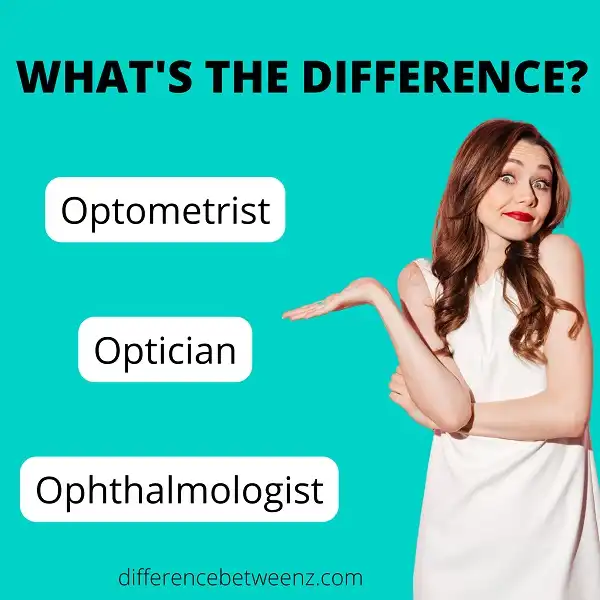Just what is the difference between optometrists, opticians, and ophthalmologists? Many people are not entirely sure. This article will help to clear up any confusion by describing each profession in detail. After reading this post, you’ll have a much better understanding of which professional you should visit for your specific eye care needs.
Who is an Optometrist?
Optometrists are primary eye care providers who are trained to examine eyes for both vision and health problems, prescribe and dispense corrective lenses, and provide other vision services. Optometrists typically complete a 4-year undergraduate program followed by 4 years of professional Optometry school.
- Upon graduation, they must pass examinations administered by the National Board of Examiners in Optometry (NBEO) in order to receive a license to practice Optometry.
- Optometrists can also choose to complete a residency program lasting 1-2 years in order to receive additional training in a specific area of Optometry such as low vision rehabilitation or pediatrics.
- Optometrists are often confused with ophthalmologists, but the two professions have different training and scope of practice. Ophthalmologists are medical doctors who specialize in the diagnosis and treatment of eye diseases, while Optometrists focus on providing primary eye care and vision services.
Who is an Optician?
- Opticians are healthcare professionals who are trained to design, verify and fit eyeglass lenses and frames, contact lenses, and other optical devices. They work closely with Optometrists and Ophthalmologists to ensure that patients receive the best possible vision care.
- Opticians use a variety of tools and techniques to measure the dimensions of a patient’s face and head in order to determine the right type of lens. They also use special equipment to test the accuracy of the lens prescription.
- In addition, Opticians are responsible for adjusting and repairing glasses and frames. They must be able to work with a wide range of patients, from young children to seniors, in order to provide them with the best possible vision care. Opticians play an important role in ensuring that patients receive the optical devices that they need in order to improve their vision.
Who is an Ophthalmologist?
Ophthalmologists are medical doctors who specialize in the diagnosis and treatment of eye disorders. They are trained to perform a variety of diagnostic tests, such as visual acuity testing and intraocular pressure measurement, and they also have expertise in the surgical management of eye conditions.
- Ophthalmologists play an important role in the early detection and treatment of vision problems, and they can often help to preserve or restore vision.
- In addition to their clinical skills, ophthalmologists must also have excellent communication skills, as they often need to explain complicated concepts to patients and their families.
- Ophthalmology is a highly competitive field, and only the best and brightest medical students are admitted to ophthalmology programs. As a result, ophthalmologists are among the most elite physician specialists.
Difference between Optometrist Optician and Ophthalmologist
There are three common types of eye care professionals: optometrists, opticians, and ophthalmologists. Optometrists are responsible for conducting routine eye exams and prescribing corrective lenses.
- Opticians dispense eyeglasses and contact lenses, according to the prescriptions written by optometrists or ophthalmologists. Ophthalmologists are medical doctors who specialize in the diagnosis and treatment of eye diseases. All three types of eye care professionals receive extensive training and must be licensed in order to practice.
- The main difference between optometrists, opticians, and ophthalmologists is the scope of their practice. Optometrists focus on routine eye care, while opticians dispense eyeglasses and contact lenses.
- Ophthalmologists treat more serious eye conditions, such as glaucoma or cataracts. As a result, ophthalmologists usually have more training than either optometrists or opticians.
Optometrists typically complete 4 years of undergraduate education followed by 4 years of professional training. Opticians usually complete a 1- or 2-year associate’s degree program. Ophthalmologists must complete 4 years of undergraduate education followed by 4 years of medical school and 3-8 years of residency training.
Conclusion
Generally speaking, optometrists are doctors who perform eye exams and can diagnose and treat certain eye conditions. Opticians are technicians who fit eyeglasses and contact lenses. If you have a vision problem that requires prescription glasses or contacts, you will need to see an optometrist. However, if you just need a new pair of glasses because your old ones broke or you lost them, then you can go to an optician.


